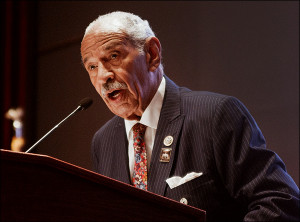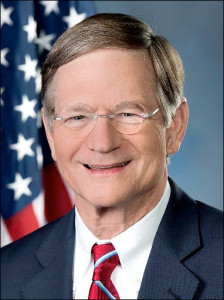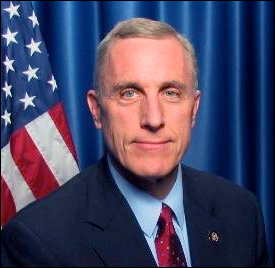
Judge Roy Moore, the Republican nominee in a special Senate election in Alabama.
By Jim Ellis
Nov. 13, 2017 — Controversy is erupting in the Alabama special US Senate election as we begin to enter the last month of campaigning before the Dec. 12 vote.
The Washington Post broke a story late last week (above) that accuses former state Supreme Court Chief Justice Roy Moore (R) of engaging in sexual contact with a 14-year old girl 38 years ago. At the time, Judge Moore would have been 32 years of age. The judge vehemently denies the charges and strikes back against the Post saying the story is politically motivated. Republican officials in Alabama are generally still supportive of Moore. Washington Republicans, who made public statements, expressed the opinion that Moore should step away from the race if the allegations are true.
In actuality, there is no legal way to remove Moore’s name from the ballot even if there is Republican unanimity to do so. Ballots are printed, some absentee packets have already been mailed to voters, and the law specifically states that a change of nominees cannot be made once the campaign moves within 76 days of the election. For this contest, the point-of-no-return date occurred on Sept. 28.
Suggestions range from running defeated Sen. Luther Strange as a write-in candidate, calling the state legislature into special session to pass emergency legislation to change the election law, or simply refusing to seat Moore should he win the Dec. 12 election. If they choose the latter route, another special election would have to be called and scheduled, and the cycle begins anew.
For his part, Moore is already launching fundraising appeals lashing out at his accusers and begging for resource help in order to fight back. He shows no indication that he will relinquish his position as the US Senate nominee.
More will clearly come of this story during the coming week.
VA-6
Continuing what looks to be a series of House incumbent retirements, veteran 13-term Virginia Rep. Bob Goodlatte (R-Roanoke), chairman of the House Judiciary Committee, announced that he, too, will depart when the current Congress adjourns. The timing coincides with his allotted chairmanship tenure also coming to an end.
Goodlatte becomes the 34th regular cycle member not to seek re-election next year, and the 24th Republican. This total does not include the PA-18 vacancy (former Rep. Tim Murphy, R-Pittsburgh) that will be filled on March 13. The latest vacant seat was filled earlier this week when Utah Rep-Elect John Curtis (R-Provo) was elected to replace resigned Congressman Jason Chaffetz (R-Alpine/Sandy).
Though the open GOP list now reaches 24 seats, 17 of them are safely or likely Republican. Only two are in the toss-up category (FL-27, Rep. Ileana Ros-Lehtinen, R-Miami; NJ-2, Rep. Frank LoBiondo, R-Ventnor City), and another five are rated as lean Republican.
Virginia’s 6th District is safely in the GOP column. Goodlatte averaged 77.6 percent of the vote over his 13 congressional elections. The district hugs the West Virginia border and runs north to south along Interstate 81 from Strasburg through Harrisonburg, Staunton, and Lexington, continuing south all the way to Roanoke, with a jut westward to annex the Lynchburg region. President Trump carried the 6th, 60-35 percent, while Mitt Romney outpaced President Barack Obama here, 60-40percent.






